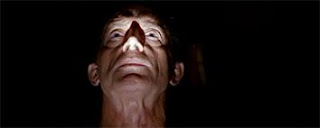Directed by Ralph Hemecker
Written by Glen Morgan and James Wong
Air Date: October 31, 1997
Guest Star: Dean Winters (Mr. Crocell)
Opening Quote: Do you ever find yourself talking to the dead? Since Willie's death, I catch myself every day, involuntary talking to him as if he were with me."
- Abraham Lincoln
"The Curse of Frank Black" stands as one of the most nuanced and engaging hours in '90s network television. The wonderful harmony of acting, directing, and acting. The episode follows Frank Black through the course of a long Halloween night. Stuck in a limbo state, he ponders the ghosts of his past, present, and future.
The episode's blend of playfulness and seriousness is captures in the first scene as Frank prepares to carve a pumpkin, but his brief moment of revelry is disrupted by a demon appearing. Later he takes Jordan (dressed as Marge Simpson in a fellow show on the Fox network) trick-or-treating, for a moment Frank think believes he sees something bad happening inside a house window, only to realize he's looking at a television set.
Then Frank being has flashback to a past Halloween and encountering Mr. Crocell, who is dealing with PTSD from his war experiences. In another flashback it's revealed Crocell took his own life years later, as a teenage Frank looks on with his peers who make some ignorant assumptions. Crocell appears again as a ghost to Frank and advises him to repair his family and disassociate from the group.
Frank also stumbles upon the yellow house and finds teenagers in the basement telling an urban legend (that's true) of Detective Bletcher being murdered inside the house, they speak of Frank the way people spoke about Mr. Crocell. A sort of living legend in his own time, Frank scares the kids and shews them away - and asks for "Bletch" to appear to no avail.
Meanwhile the numbers 26 and 8 keep appearing, you see more and more after repeated viewings. Frank discovers it's a reference to the Book of Acts, a verse about the possibility of raising the dead. While the supernatural had been often suggested in Millennium up to this point, "The Curse of Frank Black" signals the more fantastical direction of the second season.
Henriksen gives a tour de force performance, almost a one man show as he literally faces demons over a Halloween night. When his car breaks down by the Yellow House, kids are throwing eggs at the house, later in a fit of anger Frank does so as well. In his later encounter with Crocell's ghost, he admits to throwing dog crap at his house and never cleaning it. The episode ends with Frank cleaning the egg of his house, signaling the character's determination to carry on into the darkness and hopefully find the light.






